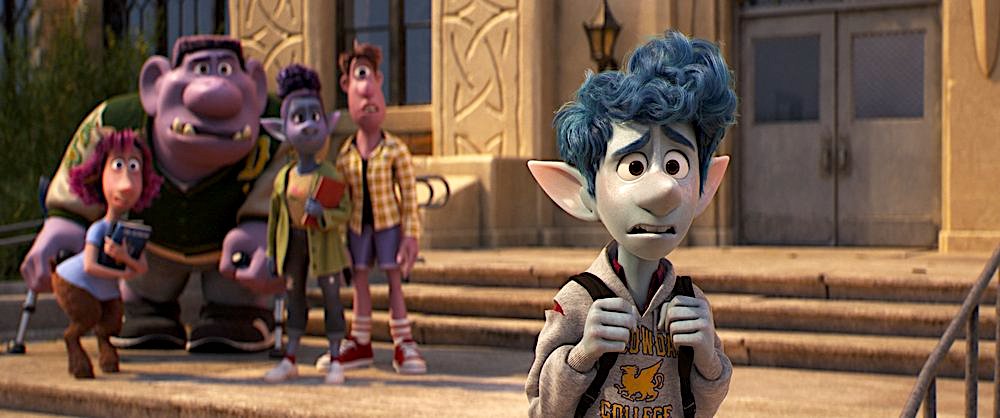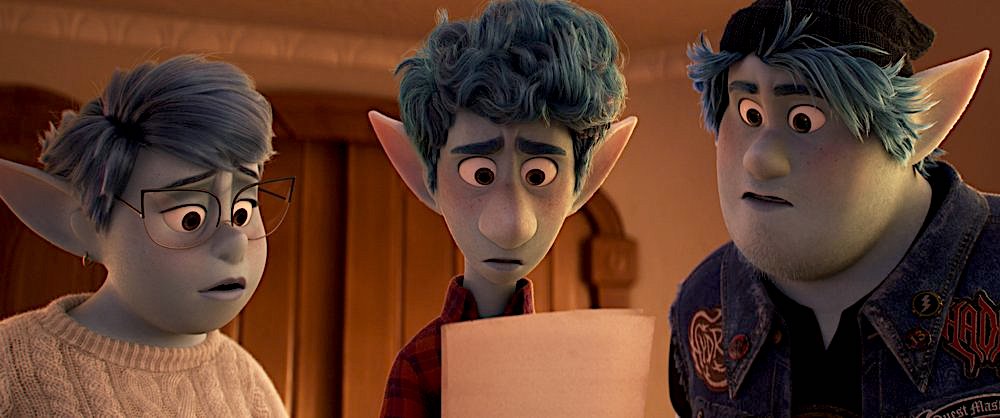
Scenes from “Onward”
Disney Pixar’s coming-of-age tale “Onward” provides more than just adventure or entertainment. For people who appreciate or miss the reassuring presence of fathers and father figures in their midst, this film, as significant for its bittersweet tale as it is for its pertinent themes, is food for the soul.
The movie is far from perfect, but it more than makes up for its meandering middle part with what it manages to accomplish: It makes viewers appreciate what they have in their imperfect lives, and brace for what lies ahead with a glass-half-full attitude.
Who knew a film with gnomes, unicorns, trolls, dragons, cyclops, pixies, fauns, manticores and elves could resonate with moviegoers as strongly as Oscar-caliber flicks do?
Pixar has so far gifted viewers with 21 films since 1995—“WALL-E,” “Ratatouille,” “Up,” “Inside Out,” “Finding Nemo” and the “Toy Story” franchise are among its most significant titles—and “Onward” is yet another welcome addition.
When you watch it, you’ll see snippets of yourself—your fears, frustrations, insecurities, joys, even deep-seated yearning for something or someone perceived as unattainable—as you keep Ian Lightfoot (voiced by Tom Holland) and his overly enthusiastic older brother Barley (Chris Pratt) company when they embark on a journey of self-discovery and growth.

From left: MomLaurel (voiced by Julia Louis Dreyfus), Ian (Tom Holland) and Barley (Chris Pratt)
Not unlike the Confucian view that posits a perfectible human nature, the film boldly asserts its belief that man’s inability to appreciate the various instances of magic that proliferate in our lives is somewhat linked to the enormity of what science and technology has done by leaps and bounds since the onset of computer age.
Ian must work his way through grief, insecurity and self-doubt just before he turns 16. But when his mother Laurel (Julia Louis Dreyfus) gives him and Barley a gift from their long-departed dad (Bryan Cranston), who succumbed to cancer even before Ian was born, the siblings decide to take on a mission that could let them “reintegrate” their dead father in their apparently incomplete lives.
But we’re getting ahead of ourselves.
The aforesaid unexpected gift comes with magic: It’s a staff that will allow Ian and Barley to spend one whole day with their dad.
But when the phoenix crystal fueling its magic breaks before Ian’s spell is completed, only the lower half of their reincarnated father is formed! The siblings then decide to make a mad dash for a replacement gem before the end of the next day’s sunset for another crack at the spell.
Can the teenage boy with low self-esteem issues muster enough courage to transmogrify into the brave man his mother believes he’s destined to be?
We’re pretty sure you have an idea how the production will play out Ian’s dilemma, this being a Disney film.
But it’s the way Pixar manages to shake up this feel-good formula and sometimes turn it on its head that sets it apart from other animated tales. It always finds insightful and creative ways to touch the heart as much as it stirs the soul—and “Onward” is no exception.
The production transports viewers into a colorful world that looks vastly different from ours, but the “feels” are just as moving. In fact, the protagonists of “Onward” manage to make their festinating fears and fascinating foibles as relatable as the cartoon characters we grew up loving—like, say, Mickey Mouse and Donald Duck.
They may not look much, but when push comes to shove, they know just what to do to (temporarily) drive our worries away and make us realize that the otherwise confusing world we inhabit doesn’t always have to be a dark place.

